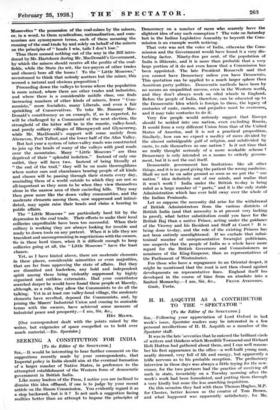SEEKING A CONSTITUTION FOR INDIA
[To the Editor of the SPECTATOR.] SIR,—It would be interesting to hear further comment on the suggestions recently made by your correspondents, that Imperial policy in India should aim at the eventual formation of a larger number of Native States, in preference to the attempted establishment of the Western form of democratic government in British India.
Like many leaders of the Press, I notice you are inclined to dismiss this idea offhand, if one is to judge by your recent article on the Simon Commission. You evidently regard it as a step backward, but is it ? Is not such a suggestion facing realities better than an attempt to impose the principles of Democracy on a number of races who scarcely have the slightest idea of any such conception ? The vote on Saturday last in the Indian Legislative Assembly to boycott the Com- mission is an example worth noticing.
That vote was not the voice of India, otherwise the Corn- mission and the Government would have found it a very dis- turbing factor. Ninety-five per cent. of the population of India is illiterate, and it is more than probable that a very large portion of it do not even know that a Commission has been appointed. The late President Roosevelt said that you cannot have Democracy unless you have Democrats. This quotation can be applied to a much larger sphere than American party politics. Democratic methods have been by no means an unqualified success, even in the Western world, and they don't always work on oiled wheels in England. Before the people of India, therefore, can be educated up to the Democratic Idea which is foreign to them, the legacy of centuries of caste, custom, and prejudice must be overcome, and it may take centuries to do it Very few people would seriously suggest that Europe should be welded into one nation, even excluding Russia. It would form a very different Union from that of the United States of America, and it is not a practical proposition. Similarly, how can we expect a medley of races divided by the almost unbridgeable gulf of religion, and subdivided by caste, to rule themselves as one nation ? Is it not time that we really thought seriously of a more workable scheme ? Democracy is only intended as a means to orderly govern- ment, but it is not the end itself.
Democratic government has limitations like all other things, and it is no good giving the patient the wrong medicine. Shall we not be on safer ground as soon as we put the " one nation " idea definitely out of our minds, and realize that it won't work ? India under the British to-day is being ruled as a large number of " parts," and it is the only stable Administration which has ever held sway over the whole of the Indian Peninsula.
Let us suppose the necessity did arise for the withdrawal of British Administrators from the various districts of British. India (and that necessity is at present very lacking in proof), what better substitution could you have for the British Raj than a native Prince, acting under the guidance of the Viceroy and his Resident and Staff at Court ? It is being done to-day, and the rule of the existing Princes has not been entirely unenlightened. If we exclude that infini- tesimal number of unrepresentative Swarajist politicians, one suspects that the people of India as a whole have more regard for the British Governors and Commissioners as nominees of the King-Emperor, than as representatives of the Parliament of Westminster.
For those who have a repugnance to an Oriental despot, it might be mentioned that the road is not then closed against developments on representative lines. England itself has developed in the course of time from an absolute into a limited Monarchy.—I am, Sir, &C., FRANK ATKINSON. Goole, Yorks.








































 Previous page
Previous page